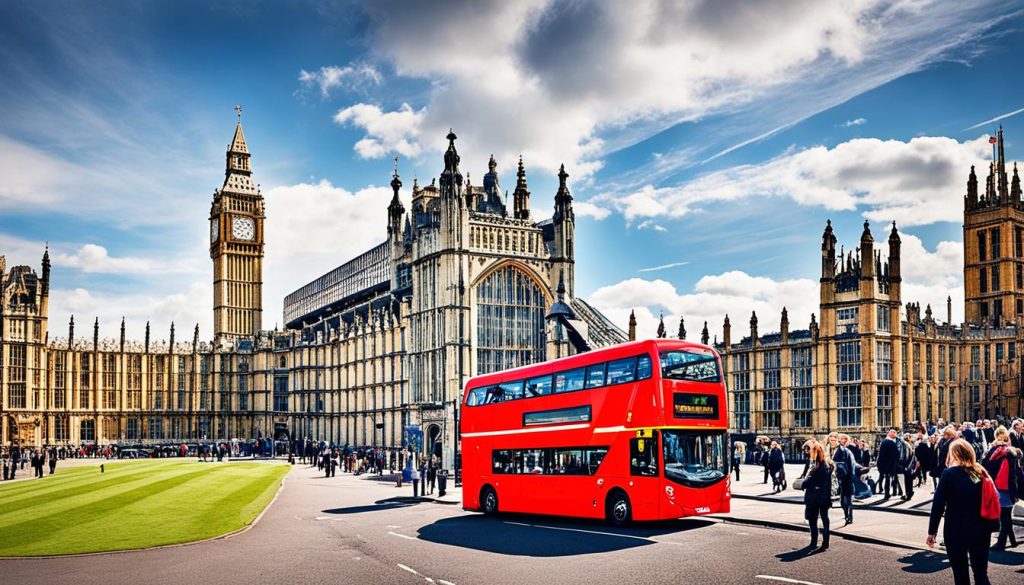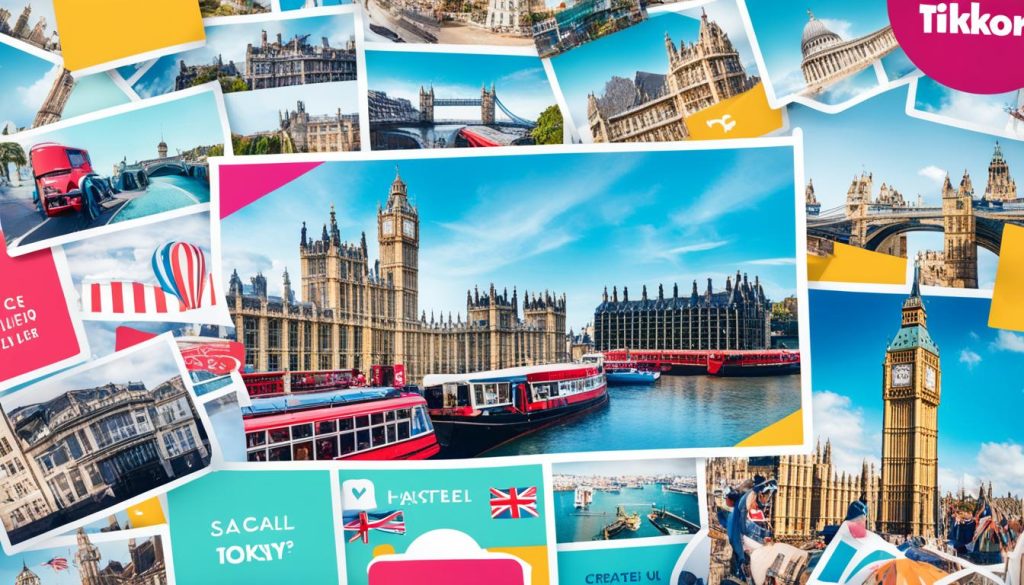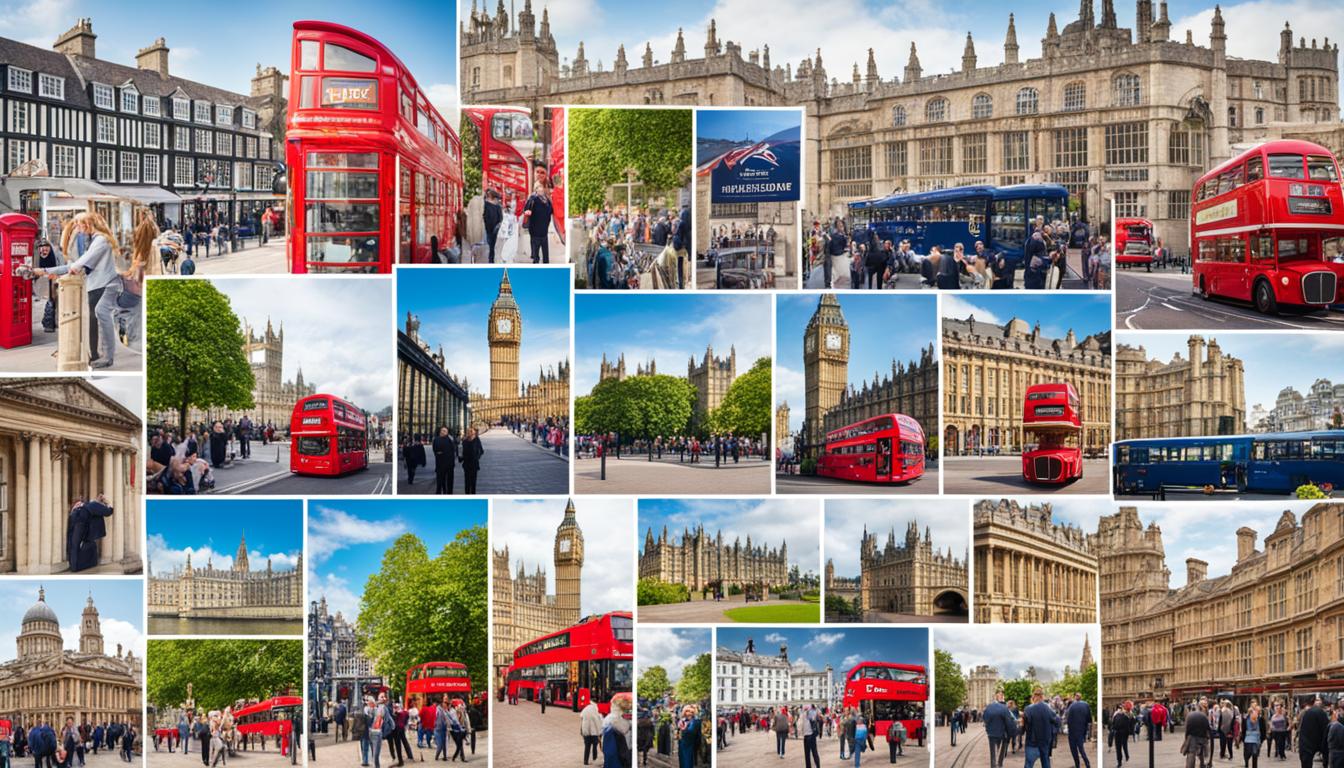The Tourism and Hospitality Industry in the UK is at a key moment. It’s changing because of new market needs and how people behave. The COVID-19 pandemic has made a big impact, especially in recent years.
With data from UK Hospitality and VisitBritain, we look at the latest UK Travel Trends. These trends are changing the Hospitality Sector UK. It shows how important it is to be adaptable and innovative for the future.
Key Takeaways
- The Tourism and Hospitality Industry is rapidly evolving in response to market demands.
- Consumer behaviour is shifting, necessitating new strategies for engagement.
- The COVID-19 pandemic has had a lasting impact on travel trends and consumer expectations.
- Data from UK Hospitality and VisitBritain provides insights into industry status.
- Innovation and adaptability are key for future growth within the sector.
Introduction to the UK Tourism and Hospitality Landscape
The UK’s tourism sector is booming, playing a big part in the country’s economy. It offers a wide range of activities, supporting millions of jobs and helping local businesses thrive. Tourism adds nearly 10% to the UK’s GDP, showing its key role in keeping the economy stable.
Places like London’s historic sites, the beautiful Lake District, and Edinburgh’s cultural spots attract millions yearly. London alone sees over 19 million visitors from abroad, boosting the hospitality industry and local economies.
Visitor numbers highlight the sector’s importance. In 2019, tourists spent £28.4 billion in the UK, as reported by the Office for National Statistics (ONS). This shows the strong demand for unique experiences and quality service in the hospitality market. With efforts to promote travel, the UK keeps drawing visitors from around the world, promising a bright future for tourism and hospitality.
| Year | Visitor Numbers (in millions) | Tourism Spending (£ Billions) |
|---|---|---|
| 2017 | 38.0 | 23.9 |
| 2018 | 38.9 | 26.6 |
| 2019 | 39.4 | 28.4 |
| 2020 | 15.3 | 9.2 |
| 2021 | 22.1 | 15.1 |
Current Trends Influencing the Tourism and Hospitality Industry
The tourism and hospitality sector is changing fast, with new trends and a focus on unique experiences. One big trend is experiential travel, where people want to dive into activities rather than just seeing sights. This shows a need for deeper connections with places, making businesses offer experiences that match what people like.
Having a strong online presence is also key. The internet is now where people connect with brands, and social media greatly influences travel choices. To stand out, companies use digital marketing and work with influencers to get noticed by potential visitors.
Travel habits are also changing, with more people opting for shorter, local trips. This has made businesses rethink their offerings. They now focus on local attractions and experiences that appeal to those staying closer to home.
- Rise of experiential travel focusing on immersive activities
- Increased reliance on social media for travel inspiration
- Growing importance of personalised customer experiences
- Shift towards localised, shorter trips
Impact of Brexit on Tourism and Hospitality

After Brexit, the UK’s travel industry changed a lot. New immigration laws made it harder for EU citizens to travel and work in the UK. This has affected the hospitality sector, with many places struggling to find workers they used to rely on.
The British Hospitality Association is worried about the lack of staff. They say it could harm the quality of service and the success of businesses.
Travel rules have also changed, affecting EU tourists coming to the UK. Now, EU visitors need visas, which has changed how they plan their trips. This has led to fewer visitors from Europe, which is a big problem for the UK’s tourism.
Businesses are now trying to find new ways to attract visitors. They’re looking to draw in people from outside the EU to make up for the loss.
The table below shows how many tourists visited the UK from key European countries before and after Brexit:
| Country | Tourist Arrivals (2019) | Tourist Arrivals (2022) | Percentage Change |
|---|---|---|---|
| France | 18 million | 12 million | -33% |
| Germany | 10 million | 7 million | -30% |
| Spain | 9 million | 5 million | -44% |
| Italy | 8 million | 4 million | -50% |
These numbers show big changes in who visits the UK. It’s making some parts of the hospitality industry worry about their future. The UK’s travel industry is trying to adapt and find new visitors to keep going.
Technology Advancements in the Industry
The tourism and hospitality sector is changing fast thanks to new technology. These changes are making things better for customers and helping businesses work more efficiently. It’s crucial for companies to keep up, especially with AI in Tourism, which helps make visits more personal and automates simple tasks.
Utilisation of Artificial Intelligence
AI in Tourism helps companies understand what customers like and offer them better experiences. Hotels and travel agencies use AI to make booking easier and suggest things based on what customers liked before. This also helps set the right prices by looking at market trends, which can make more money for businesses.
As more companies compete, using AI is key to meeting customer needs and improving services. This makes a big difference in how well a business does.
Rise of Contactless Technology
Health worries have made Contactless Payment Systems more popular in the industry. Many places are now using mobile payments, making it easy and safe for guests to pay. This change helps with health and safety and makes things run smoother by cutting down on contact between staff and guests.
Customers like places that use the latest tech, which shows why investing in modern payment systems is important to stay ahead.
| Technology | Description | Impact on Industry |
|---|---|---|
| AI in Tourism | Utilises data analysis to enhance customer experiences and optimise pricing | Increased customer satisfaction and revenue |
| Contactless Payment Systems | Enables safe and efficient transactions without physical contact | Improved guest confidence and operational efficiency |
Sustainable Practices in Tourism and Hospitality
The tourism and hospitality sectors are now focusing more on sustainability. This change comes as more people care about the environment. Sustainable Tourism UK is becoming more popular as people look for eco-friendly options.
Companies like AccorHotels are leading the way with their green efforts. They’re cutting down on single-use plastics, using less energy, and buying food locally. This helps the local economy and cuts down on carbon emissions.
Now, more tourists want to visit places that help protect the environment and culture. There are even certifications for hotels that follow green tourism practices. This shows how businesses can be both successful and eco-friendly.
| Company | Eco-Friendly Initiatives | Impact on Sustainability |
|---|---|---|
| AccorHotels | Reduction of single-use plastics | Lower waste output |
| Marriott International | Energy-efficient lighting installations | Decreased energy consumption |
| Hilton | Local sourcing of food | Support for local economies and reduced carbon footprint |
Domestic Tourism Growth Post-Pandemic
The COVID-19 pandemic changed how people travel in the UK. With travel to other countries limited, many Britons chose to visit places closer to home. This led to a big increase in staycations. People started to see the beauty and fun in exploring their own country.
Surveys show a big change in how people plan their holidays. Staycations are now a long-term choice, not just a quick trend. Places like the Scottish Highlands and Cornwall are getting more popular. Families want to enjoy beautiful views and local sights.
- Change in consumer preferences towards local travel experiences
- Increased spending on domestic tourism in various UK regions
- VisitScotland reports a rising trend in outdoor activities and heritage sites
- Growth of eco-friendly options enhancing the appeal of local journeys
As travel patterns change after COVID, the focus is on connecting with local communities. There’s a big demand for unique, real experiences. This is making the domestic tourism industry come up with new ideas.
Changing Customer Expectations and Preferences
The tourism and hospitality sectors are changing fast, thanks to new customer wants. People now look for more than just basic services. They want travel experiences that fit their own tastes. This change shows a deeper understanding of what people want, especially after recent global events.
The Demand for Personalised Experiences
Today, customers want services that are made just for them. This means unique travel plans, special places to stay, and activities they’ll enjoy. Making services fit what each person likes makes customers happier and more likely to come back. Companies like Airbnb and Booking.com have noticed this and let customers pick experiences that match their interests. This could be anything from food tours to cultural visits or wellness retreats.
Health and Safety Considerations
After the pandemic, making sure places are clean and safe is top priority for customers. Surveys show that nearly 80% of travellers say they think about health and safety when choosing where to stay. Tourism businesses must meet these high standards. They need to be open about their health measures to make guests feel safe and improve their stay.
Emerging Destinations within the UK
The UK’s tourism scene is changing with new places to visit. Places like the Northumberland coast and Scotland’s Highlands are now popular for their beauty and history. They offer amazing views, rich stories, and vibrant cultures.
More people want to travel off the beaten path too. This means they look for places that are not as well-known. These spots let visitors really connect with local life and try out unique activities.
Now, these new places are becoming big tourist spots. For example, more people are visiting the Scottish Highlands and Northumberland. This change helps local economies and promotes eco-friendly tourism as visitors learn to respect these areas.
| Destination | Key Attractions | Visitor Increase (%) |
|---|---|---|
| Northumberland Coast | Dramatic cliffs, beaches, and castles | 25% |
| Highlands of Scotland | Lochs, mountains, and traditional culture | 30% |
| Isle of Skye | Stunning landscapes and wildlife | 22% |
These new destinations show how tourism can grow in a sustainable way in the UK. They invite us to see the beauty of our country in a new light.
Tourism and Hospitality Industry’s Economic Contribution

The tourism and hospitality sectors are crucial for the UK’s economy. They bring in a lot of money, helping the country and local areas grow. VisitBritain’s latest figures show that tourism supports millions of jobs across the country.
The hospitality industry creates jobs in many ways. It includes things like hotels, restaurants, and entertainment. This helps local businesses grow and brings in more money. The industry does more than just make money; it also helps communities and builds infrastructure.
| Indicators | Tourism Contribution (£ billion) | Employment (thousands) |
|---|---|---|
| Total Tourism Revenue | 207 | 1,600 |
| Domestic Tourism | 134 | 1,100 |
| International Tourism | 73 | 500 |
The tourism and hospitality sectors are key to the UK’s economic health. As the country recovers, supporting these sectors is vital. It will help keep the economy strong and growing.
Challenges Facing the Tourism and Hospitality Sector
The UK’s tourism and hospitality industry is facing many challenges that affect its recovery and growth. Staffing issues are a big problem, showing changes in the sector. The pandemic has caused big disruptions, leading to a lack of skilled workers and making it hard to hire in many places.
Staffing Shortages and Recruitment Issues
After the pandemic, staffing shortages have gotten worse, affecting the quality of service in hospitality. The Office for National Statistics (ONS) says many businesses are finding it hard to hire enough staff. These challenges are not just about filling jobs; they’re about finding people with the right skills and experience to keep up service standards.
Recruitment in hospitality is complex. Changes in the workforce, competition from other industries, and new employee expectations are some of the reasons for these staffing problems. Many workers now prefer jobs that offer more flexibility or the chance to work from home. This makes it tough for hospitality places to find new staff.
These challenges affect more than just finding staff right now. The long-term success of the tourism industry depends on its ability to keep skilled workers. It’s important to keep working on recruitment in hospitality to help businesses stay competitive and adapt to changes in the market.
Future Predictions for the Industry
The future of Tourism UK will see new innovations and changes due to how people behave and tech advances. Experts say the Hospitality Industry will change a lot. This change will come from a mix of leisure and business travel.
People want to experience new things when they travel, not just see sights. They want to connect deeply with local cultures. Places that offer real experiences will do well.
What will shape the future includes:
- Growing focus on being green and eco-friendly.
- Using more technology like virtual reality and AI for personal touches.
- Offering flexible options to meet different customer needs.
Experts believe it’s key to update marketing to match what people want to see. Highlighting safety and health can build trust and increase bookings after the pandemic.
| Trend | Impact on Future |
|---|---|
| Sustainability Focus | Increased customer loyalty and brand value. |
| Technological Integration | Enhanced customer experiences and operational efficiency. |
| Personalisation | Stronger engagement and customer retention. |
| Health and Safety Protocols | Boosted confidence in travel decisions. |
The future looks bright for tourism and hospitality in the UK. Staying in touch with these trends is key to success in a fast-changing world.
Role of Marketing Strategies in the Tourism and Hospitality Sector

In today’s fast-paced world, having strong Tourism Marketing Strategies is key for success in tourism and hospitality. The way people behave has changed a lot, especially with digital media. Now, businesses use platforms where people spend their time to grab their attention and keep them interested.
Influencer Marketing Trends
Influencer marketing is now a big deal in Hospitality Advertising. Brands work with social media influencers to get noticed and trusted more. Influencer Trends UK show how real voices can make people want to visit new places and try new things.
Many campaigns have shown that working with influencers can really pay off. Brands that teamed up with influencers saw more people engaging with their brand and sticking with it. This way of talking directly to people is key because people often listen to what others say.
Now, brands can use tools to see how well their influencer campaigns are doing. They look at things like how many people are engaging, how many are turning into customers, and how many new followers they get. This helps brands stay on top of what people want and keep drawing in customers.
| Influencer Type | Engagement Rate | Target Audience |
|---|---|---|
| Macro Influencers | 3-6% | Broad Audience |
| Micro Influencers | 7-10% | Niche Markets |
| Nano Influencers | 10-15% | Highly Engaged Communities |
As tourism marketing keeps changing, using these influencer trends is crucial for brands to succeed in the tourism and hospitality world.
Case Studies of Successful Brands in the Industry
Successful Hospitality Brands UK have shown great flexibility in a fast-changing market. Marriott Hotels and Travelodge are great examples. They’ve made new Brand Strategies to stay relevant and meet what customers want.
Marriott Hotels has used technology to make guests’ stays better. Their mobile app makes checking in easy and offers services tailored to each guest. These tech steps are key to keeping customers interested in a tough market.
Travelodge has also changed its approach. They listened to what customers said and updated their rooms without making them too expensive. This shows how Successful Hospitality Brands UK focus on giving value without cutting corners.
The table below shows how these strategies worked out for the brands:
| Brand | Strategy | Outcome |
|---|---|---|
| Marriott Hotels | Technology integration | Increased customer satisfaction and loyalty |
| Travelodge | Customer feedback-driven redesign | Boosted occupancy rates and positive reviews |
These Case Studies Tourism give us key lessons on brand success in hospitality. They show how new ideas can lead to lasting success in the industry.
Government Policies and Support for the Industry
In recent years, the UK Government has launched policies to help the tourism and hospitality sectors. One key move was cutting VAT for the hospitality industry. This helped ease financial burdens and boost spending during tough times. It shows the Government’s commitment to supporting tourism in the UK.
Through various tourism policies, the Government has boosted support for businesses in the industry. For example, during the COVID-19 pandemic, grants, loans, and the ‘Eat Out to Help Out’ scheme were introduced. These measures helped save jobs and encouraged people to eat out and travel again.
As the UK’s tourism sector recovers, ongoing government support is crucial. Initiatives focusing on sustainable practices and digital transformation are key to a strong future for the hospitality industry. By investing in policies that promote growth and adaptability, the Government can help the tourism and hospitality sectors thrive.
FAQ
What are the current trends in the UK tourism and hospitality industry?
Experiential travel is on the rise, and so is the digital presence. Social media greatly influences what people choose to do. Technology is also bringing new innovations like artificial intelligence and contactless payments.
How has Brexit affected the hospitality sector in the UK?
Brexit has changed immigration laws and travel rules. It has also affected EU tourists coming to the UK. The industry is facing both challenges and new chances as it adjusts.
What technological advancements are currently transforming the tourism and hospitality sectors?
Artificial intelligence is making customer experiences better. Contactless payments are becoming more common, thanks to health concerns during the COVID-19 pandemic.
Why is sustainable tourism becoming increasingly important?
More people want eco-friendly tourism now. Companies are starting to use less waste and save energy to meet these demands.
What factors have contributed to the growth of domestic tourism post-pandemic?
Staycations and local travel are up because of the pandemic. People now value safety and convenience more when choosing where to go.
How are customer expectations changing in the tourism sector?
People want more personal travel experiences. They also care more about health and safety in hotels and resorts. Businesses need to keep up with these changes to stay ahead.
Which emerging destinations are gaining popularity in the UK?
Places like the Northumberland coast and the Scottish Highlands are getting more popular. Travelers are looking for new spots away from the usual tourist spots.
What is the economic contribution of the tourism and hospitality sectors in the UK?
These sectors are big contributors to the UK’s economy. They support millions of jobs and help the economy grow through tourism money and local business growth.
What challenges are currently facing the hospitality sector?
The industry is facing issues with finding enough staff, made worse by the pandemic. Finding ways to keep a stable workforce is a big concern for businesses.
What predictions are there for the future of the tourism and hospitality industry?
The future looks set for more changes in tourism, thanks to new tech and changing consumer habits. Experts think the industry will bounce back and keep evolving, with new trends becoming standard.
How are marketing strategies evolving within the tourism and hospitality sectors?
Marketing is now using influencers and social media more to get noticed and engage with customers. Successful campaigns show how important it is to keep up with digital trends.
What role does government policy play in supporting the hospitality industry?
Government policies, like financial help and rules, are key to supporting the hospitality sector. They’re especially important in times of crisis, like during the pandemic.









